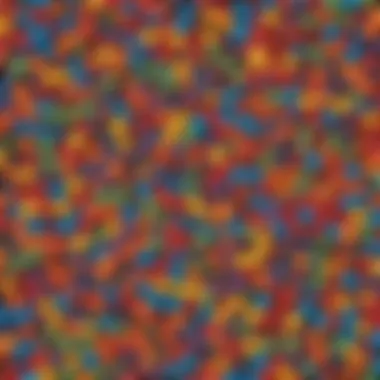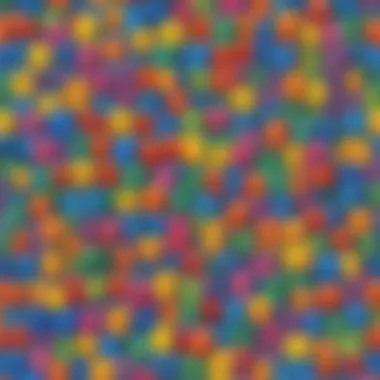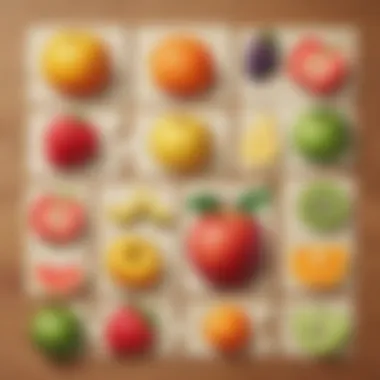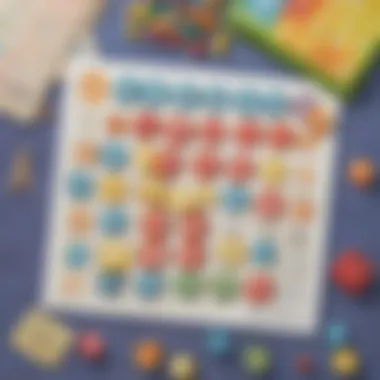Engage Little Minds with Interactive Addition Games for Preschoolers


Science Fun Facts
Embarking on the journey of learning addition can be a fascinating endeavor for preschoolers. Did you know that the concept of addition dates back to ancient civilizations? Humans have been using addition to solve practical problems for centuries, showcasing its importance in everyday life. Understanding addition at a young age sets a solid foundation for more complex mathematical concepts in the future.
While preschoolers may find addition challenging initially, approaching it through interactive games can spark their interest and make learning enjoyable. Integrating colorful visuals, tactile elements, and playful themes into addition games can enhance engagement and retention for young learners. By immersing children in hands-on activities, educators can create a conducive environment for exploring mathematical concepts with curiosity and enthusiasm.
Uncovering the wonders of addition through enriching games not only cultivates mathematical skills but also fosters cognitive development, problem-solving abilities, and critical thinking skills in preschoolers. By unlocking the potential of play-based learning, educators can instill a lifelong love for mathematics in children, paving the way for future academic achievements.
Introduction
Importance of Early Math Education
Early math education plays a pivotal role in shaping a child's cognitive abilities and overall academic performance. It sets the stage for advanced mathematical skills by building a strong mathematical mindset from the formative years. Through early exposure to numerical concepts, preschoolers develop critical thinking, problem-solving, and analytical skills. This lays a crucial groundwork for future learning, enhancing their capacity to comprehend complex mathematical principles with confidence and proficiency.
Benefits of Learning through Play
Learning through play offers myriad advantages for preschoolers, especially when exploring mathematical concepts like addition. Play-based activities not only make learning enjoyable but also foster a deeper understanding of abstract notions. By engaging in interactive addition games, children develop mathematical fluency, cognitive flexibility, and spatial reasoning skills in a natural and immersive manner. Moreover, play-based learning cultivates creativity, collaboration, and intrinsic motivation, instilling a positive attitude towards mathematics and learning as a whole. Through these engaging experiences, preschoolers can explore, experiment, and internalize mathematical concepts, paving the way for a lifelong love of learning.


Interactive Addition Games
Interactive addition games play a crucial role in facilitating early math education for preschoolers. By blending learning with play, these games offer an engaging way for young learners to grasp fundamental mathematical concepts. Through interactive games, children can develop their numeracy skills while having fun, fostering a positive attitude towards math from an early age. Additionally, these games help in promoting critical thinking, problem-solving abilities, and spatial reasoning among preschoolers. To ensure an effective learning experience, it is essential to select games that are age-appropriate, stimulating, and aligned with educational objectives.
Counting Game
Counting Fruits:
Counting fruits is a fundamental aspect of early math education for preschoolers. This activity not only enhances children's counting skills but also introduces them to basic addition concepts. By visually associating numbers with real-world objects like fruits, young learners can better understand the abstraction of numbers. Counting fruits encourages children to develop number sense, improve one-to-one correspondence, and grasp the concept of addition through simple arithmetic operations. This hands-on activity provides a sensory-rich experience that appeals to preschoolers' tactile and visual learning styles, making learning engaging and memorable.
Counting Animals:
Counting animals is another interactive addition game that contributes significantly to preschoolers' mathematical development. This game offers a fun and lively way for children to practice counting while incorporating elements of addition. By counting animals, young learners not only strengthen their counting abilities but also enhance their ability to associate numbers with quantities. This game aims to improve children's numerical fluency, boost their confidence in solving basic math problems, and lay a strong foundation for more complex mathematical operations in the future. Additionally, counting animals promotes language development, as children often vocalize the names of animals they are counting, enriching their vocabulary.
Number Bond Puzzles
Simple Number Bonds:
Simple number bonds play a significant role in helping preschoolers understand the relationship between numbers and how they combine to form a whole. By breaking down numbers into their component parts, children can visualize addition as a composition of smaller units. Simple number bonds enhance children's computational fluency, mental math skills, and ability to decompose numbers. This activity encourages critical thinking, problem-solving, and conceptual understanding of addition, laying the groundwork for more advanced mathematical concepts. Through hands-on practice with number bond puzzles, preschoolers develop a solid mathematical foundation and gain confidence in working with numbers.


Number Bond Matching:
Number bond matching activities offer preschoolers a hands-on way to deepen their understanding of addition. By matching number pairs to their corresponding sums, children reinforce their comprehension of addition facts and improve their memory retention of basic arithmetic relationships. Number bond matching encourages visual learning, spatial reasoning, and logical thinking. This interactive game helps children recognize number patterns, develop number fluency, and enhance their ability to perform mental calculations. By engaging in number bond matching activities, preschoolers build a strong conceptual understanding of addition and gain proficiency in basic mathematical operations.
Addition Bingo
Basic Addition Bingo:
Basic addition bingo is an entertaining and effective way for preschoolers to practice their addition skills while enjoying a group game environment. This interactive game reinforces basic arithmetic operations and number recognition. By engaging in addition bingo, children sharpen their mental math abilities, enhance their problem-solving skills, and boost their confidence in tackling math challenges. Basic addition bingo fosters a sense of competition, collaboration, and excitement around learning math. Moreover, this game promotes social interaction, communication skills, and strategic thinking among preschoolers, creating a dynamic and engaging learning atmosphere.
Picture Addition Bingo:
Picture addition bingo introduces a visual element to traditional bingo gameplay, making the learning experience more colorful and engaging for preschoolers. By using pictures instead of numbers, children learn to associate visual representations with numerical values, enhancing their cognitive abilities and memory retention. Picture addition bingo cultivates creativity, critical thinking, and observation skills in young learners. This game encourages children to make connections between visual cues and mathematical concepts, fostering a deeper understanding of addition. Moreover, picture addition bingo sparks imagination, curiosity, and enthusiasm for learning math, creating an interactive and stimulating educational environment.
Math Manipulative Activities
Using Counting Bears:
Using counting bears as math manipulatives is a hands-on approach to teaching addition to preschoolers. These colorful and tactile bears serve as visual aids that help children understand addition concepts concretely. By manipulating counting bears, children can physically visualize addition as combining and sorting different quantities. This activity enhances children's fine motor skills, spatial awareness, and hand-eye coordination. Using counting bears not only makes learning addition interactive and fun but also allows children to explore mathematical concepts in a multisensory manner, catering to varying learning styles.


Lego Addition:
Lego addition blends creativity with mathematical learning, offering preschoolers a unique way to practice addition skills. By using Lego blocks as manipulatives, children can build, count, and add in a hands-on and imaginative way. Lego addition activities promote spatial reasoning, problem-solving, and creativity, allowing children to explore mathematical concepts through construction and play. This interactive approach to learning addition encourages experimentation, critical thinking, and collaboration among preschoolers. Through Lego addition, children develop mathematical fluency, logical reasoning, and a deeper appreciation for the interconnectedness of numbers and shapes.
Digital Addition Games
Math Apps for Preschoolers:
Math apps for preschoolers provide a convenient and interactive platform for children to engage with addition concepts using technology. These apps offer engaging visuals, interactive challenges, and immediate feedback, making learning fun and rewarding for young learners. Math apps cater to different learning styles, allowing children to practice addition at their own pace and skill level. Through math apps, preschoolers can develop essential math skills, such as number recognition, counting, and addition, in an engaging and motivating way. This digital approach to addition games fosters digital literacy, problem-solving abilities, and adaptability in children, preparing them for a technology-driven world.
Online Addition Games:
Online addition games offer a variety of interactive challenges and puzzles that encourage preschoolers to practice addition skills in a virtual environment. These games combine fun gameplay with educational content, keeping children entertained while reinforcing math concepts. Online addition games provide immediate feedback, progress tracking, and adaptive difficulty levels, ensuring personalized learning experiences for each child. By engaging in online addition games, preschoolers improve their computational fluency, problem-solving skills, and strategic thinking. These games stimulate logical reasoning, attention to detail, and perseverance, nurturing a positive attitude towards learning math in a digital era.
Tips for Maximizing Learning
When it comes to tips for maximizing learning, one essential element to consider is the incorporation of multisensory experiences. Research indicates that children learn best when they engage multiple senses simultaneously. Therefore, integrating tactile materials like counting beads, colorful manipulatives, and sensory play can facilitate a deeper understanding of mathematical concepts. By appealing to different modalities of learning, caregivers can cater to varying learning styles and ensure comprehensive comprehension of addition principles.
Moreover, leveraging positive reinforcement techniques is paramount in fostering a conducive learning environment for preschoolers. By acknowledging and rewarding children's progress and efforts, caregivers can motivate them to persist in their learning journey. Celebrating small victories and milestones not only boosts children's confidence but also instills a sense of accomplishment, fueling their enthusiasm for further exploration and learning.
Another beneficial tip for maximizing learning is to integrate real-world examples into addition activities. By contextualizing mathematical concepts within familiar scenarios, such as daily routines, shopping experiences, or playtime settings, children can grasp the practical relevance of addition in their everyday lives. This approach not only makes learning meaningful and relatable but also cultivates problem-solving skills and critical thinking abilities in young learners.
Lastly, staying patient and supportive throughout the learning process is vital for nurturing a positive attitude towards mathematics. Recognizing that each child learns at their own pace and may encounter challenges along the way, caregivers need to demonstrate patience, understanding, and encouragement. By providing a safe and supportive learning environment, children feel empowered to explore, experiment, and ultimately excel in their mathematical journey.
In essence, the tips for maximizing learning outlined in this section offer valuable insights and strategies to enrich the educational experience for preschoolers. By embracing innovative approaches, fostering a positive learning environment, and tailoring teaching methods to individual needs, caregivers can ignite a lifelong passion for learning and empower young minds to excel in mathematics.







